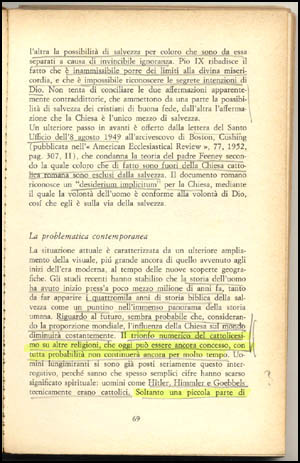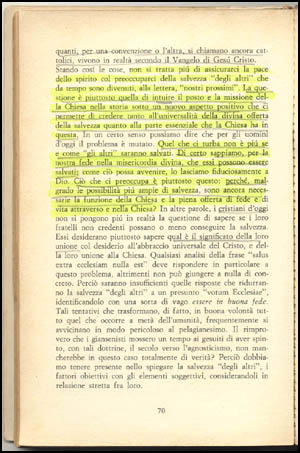PROGRESSIVIST DOCUMENT OF THE WEEK
Ratzinger Denies the Dogma
‘Extra Ecclesiam Nulla Salus’
In the aftermath of Vatican II many studies were made to explain the consequences of the conciliar documents. One of these was the book La Fine della Chiesa come Societa Perfetta [The End of the Church as a Perfect Society]. The work was composed of 13 articles by authors with a progressivist point-of-view regarding how the Church should change to be inserted in the evolution of the world.
Joseph Ratzinger was one of the progressivist theologians who gave his opinion. He wrote two articles for this book. In one of them Ratzinger takes as a consumate fact that the dogma "extra Ecclesiam nulla salus" [there is no salvation outside the Catholic Church] changed. Without presenting any argument he considered that the dogma doesn't make sense when compared to the modern geographic discoveries that "prove" that the world has millions of years, instead of the 4,000 years of the biblical history. He implies that it cannot be true that all the people that lived during these millions of years were not saved. Based solely on this imaginary "evidence" of the disputable modern discoveries, Ratzinger considers it obsolete to defend the mentioned Catholic dogma. No argument was presented. He jumped over it and went on to investigate the future of the Church without the dogma "extra Ecclesiam nulla salus."
We thought it would be interesting to present to our readers a close-up in which Ratzinger, today Benedict XVI, clearly denied that dogma.
Top right, you see a facsimile of the book cover. At right, is a photocopy of the Italian text. Below, we present our own translation.
Regarding the future, it seems likely that, in global terms, the influence of the Church over the world will constantly diminish. The numeric triumph of Catholicism over other religions, which today can still be admitted, probably will not continue. ....
In this state of things, one should no longer be concerned with the salvation of 'the others,' who for some time now have become 'our brothers.' Above all, the central question is to have an intuition of the Church's position and mission in History under a positive new point-of-view. This new point-of-view should allow one to believe in the universal offer of the grace of salvation as well as the essential part that the Church plays in this. Therefore, in this sense the problem changed.
What concerns us is no longer how 'the others' will be saved. Certainly we know, by our faith in divine mercy, that they can be saved. How this happens, we leave to God. The point that does concern us is principally this: Why, despite the wider possibility of salvation, is the Church still necessary? Why should faith and life still continue to come through her? In other words, the present day Christians no longer question if their non-believer brothers can reach salvation. Overall, they desire to know what is the meaning of their union with the universal embrace of Christ and their union with the Church
(Joseph Ratzinger, "Necessita della missione della Chiesa nel mondo," in La Fine della Chiesa come Societa Perfetta, Verona: Mondatori, 1968, pp 69-70).
|



|
|
